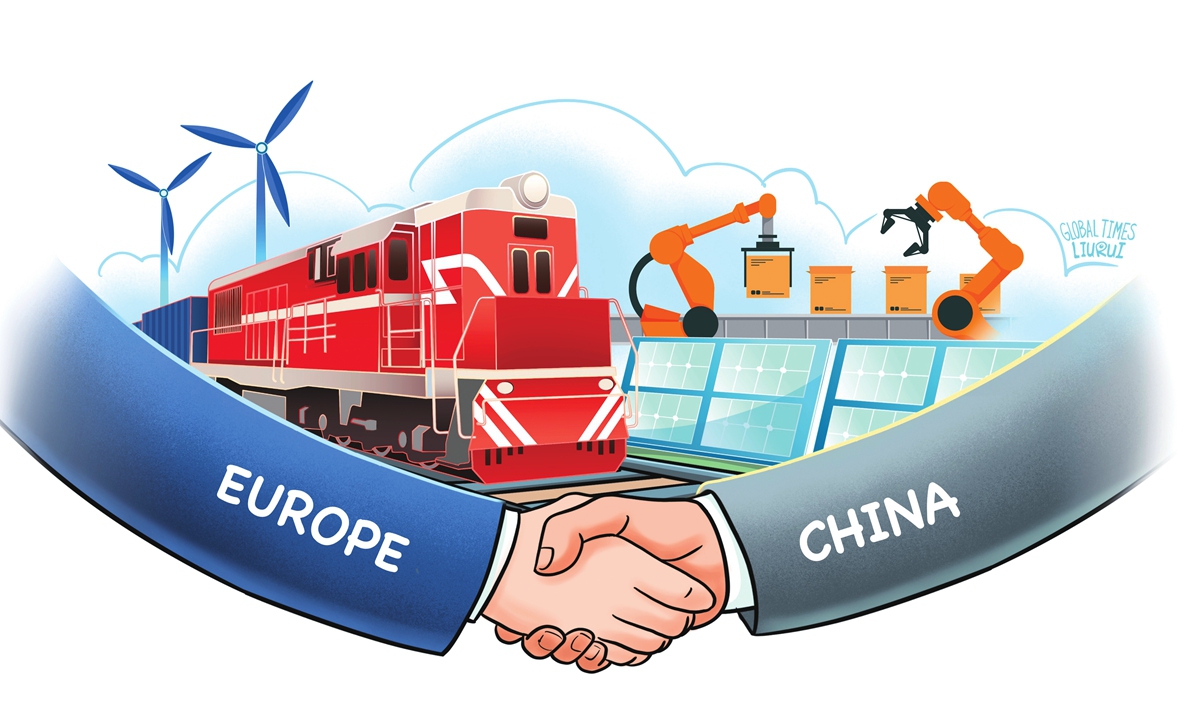
Illustration: Liu Rui/GT
Recently, European Commission Deputy Chief Spokesperson Arianna Podesta said in a media interview that the trade negotiations between the EU and the US would not affect the EU's policy toward China. She emphasized that the EU's approach toward China remains "the same" and that it has no intention of "decoupling" from China. Although the EU still maintains a degree of caution in its stance toward China, its latest remarks suggest that it has begun to reassess its relationship with China and is proactively sending positive signals.
As two major pillars of the global economy, China and the EU already share a solid foundation for cooperation. In the context of the US wielding tariffs as a weapon and launching indiscriminate attacks on other countries, the importance of China-EU cooperation has become increasingly prominent.
First, the tariff war has undermined the international environment on which both China and Europe rely for economic development. Although China and the EU have followed different development paths, both are deeply integrated into the global economy and have greatly benefited from this integration. If the US-initiated tariff war forcibly disrupts the balance of global production and supply chains, the interests of both China and Europe will suffer significant damage. Cooperation between China and the EU will help reduce the risks each faces in their development and contribute to the stability of the international economic order.
Second, China-EU cooperation aligns with Europe's development plan for "strategic autonomy." Shortly after the current US administration took office, it deliberately ignored Europe's position and role, casting doubt on the "shared" values that have long defined US-EU relations. The subsequent tariff policies implemented by the US further eroded the EU's confidence in the dollar-based system and in America's commitments.
The EU has begun to realize that only by getting rid of dependence and achieving "strategic autonomy" can it take the initiative in economy, security and other fields. There is no fundamental contradiction between China and Europe. The two sides are highly complementary in terms of market demand, industrial structure, investment and technological cooperation. China-EU cooperation can help Europe build a more stable and risk-resistant supply chain and inject more resilience into its economy.
Third, China-EU cooperation aligns with both sides' shared pursuit of upholding the multilateral order. The EU's development trajectory is essentially a practical process of seeking "certainty" through institutional integration within the framework of multilateral rules, and its economic growth at certain periods benefited from the coordinated cooperation of its member states and the prevalence of multilateralism globally. US actions such as its "withdrawal" from international organizations and tariff bullying directly undermine the multilateral international order and the EU's "survival foundation." China has consistently been an important force in upholding and practicing multilateralism, prioritizing a constructive role within multilateral organizations like the UN. Therefore, China and Europe share common visions and broad common interests in upholding the multilateral trading system and opposing unilateralism. Cooperation between the two sides doesn't just provide a "ballast stone" for global economic stability. It also sends a strong signal to the world of their commitment to maintaining the multilateral order.
With disagreements within the EU and cognitive biases regarding China, the EU's attitude toward China will likely remain "unsettled" for some time.
However, there is undeniable potential and motivation for further China-EU cooperation. China and Europe working together is not only a necessary choice aligned with historical trends, but also an active undertaking to safeguard shared human interests. Only by upholding free and open trade as well as deepening pragmatic cooperation, can the two sides dispel the haze of protectionism and pave a stable and developing channel for global governance.
The author is an associate professor at the School of Government, Shanghai University of Political Science and Law. opinion@globaltimes.com.cn



